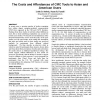Free Online Productivity Tools
i2Speak
i2Symbol
i2OCR
iTex2Img
iWeb2Print
iWeb2Shot
i2Type
iPdf2Split
iPdf2Merge
i2Bopomofo
i2Arabic
i2Style
i2Image
i2PDF
iLatex2Rtf
Sci2ools
CSCW
2010
ACM
2010
ACM
What's it worth to you?: the costs and affordances of CMC tools to asian and american users
In recent years, a growing number of studies examining how culture shapes computer-mediated communication (CMC) have appeared in the CHI and CSCW literature. Findings from these studies reveal that cultural differences exist, but no clear underlying explanation can account for results across studies. We describe several limitations of the theoretical frameworks used to motivate many of the prior studies over the past decade, most notably the assumption that tasks and media used in these studies are perceived similarly by participants from different cultural backgrounds. We then describe an interview study in which we asked 22 participants from America, Korea, India and China about their perceptions of media and motivations for media choices in different hypothetical settings. The results suggest cultural differences in how media are perceived, specifically, that the ability for media to support social in addition to task processes is more important for participants from China, Korea a...
CSCW 2010 | Cultural Differences | Differences General Terms | Keywords Computer-mediated Communication | Social Sciences |
| Added | 17 Mar 2010 |
| Updated | 17 Mar 2010 |
| Type | Conference |
| Year | 2010 |
| Where | CSCW |
| Authors | Leslie D. Setlock, Susan R. Fussell |
Comments (0)

